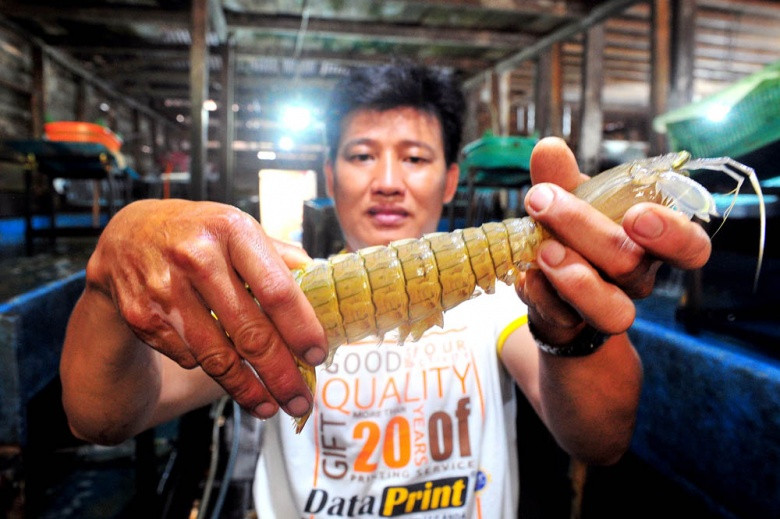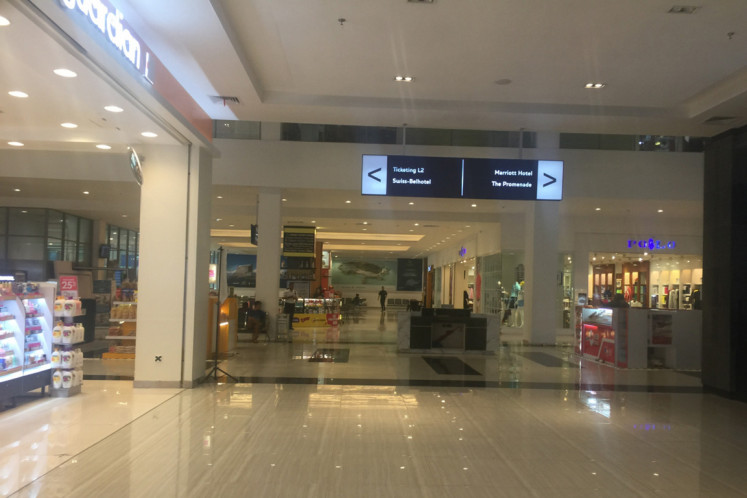Popular Reads
Top Results
Can't find what you're looking for?
View all search resultsPopular Reads
Top Results
Can't find what you're looking for?
View all search resultsBattered by virus: Businesses across Indonesia feel the pinch
Change text size
Gift Premium Articles
to Anyone
 Big blow: A worker holds a grasshopper shrimp at Kuala Tungkal fishermen’s village, West Tanjungjabung, Jambi, on Mar. 10, 2020. Shrimp sales have slumped from an average of 2,500 shrimps per month to 800 only after the suspension of flights to several countries affected by COVID-19 coronavirus. (Antara/Wahdi Septiawan)
Big blow: A worker holds a grasshopper shrimp at Kuala Tungkal fishermen’s village, West Tanjungjabung, Jambi, on Mar. 10, 2020. Shrimp sales have slumped from an average of 2,500 shrimps per month to 800 only after the suspension of flights to several countries affected by COVID-19 coronavirus. (Antara/Wahdi Septiawan)
F
rom empty malls to factories disruption, the coronavirus disease 2019 (COVID-19) is dealing a hard blow to Indonesia's regional economy and small and medium enterprises around the archipelago.
Micro, Small and Medium Enterprises (MSME) Association (Akumindo) chairman Ikhsan Ingratubun estimates that MSME sales dropped 30 to 35 percent across Indonesia from February until March 9. He predicted that the sector would continue to feel the virus impact for the next three months.
"There needs to be concrete action from the government,” he said, “so that the economy can recover as fast as possible.”
Indonesia announced a Rp 10.3 trillion (US$742 million) incentive package on Feb. 26 to boost consumer spending and prevent a steep drop in the tourism industry through tax incentives and fund transfers to the most-affected regions. A second stimulus package is for the manufacturing industry, importers and exporters faced with severe supply chain disruption.
Cooperatives and Small and Medium Enterprises Minister Tenten Masduki downplayed the concerns on Monday, claiming that the coronavirus presented an "opportunity" for MSME to supply domestic industries and consumers amid scarcity of some imported products, citing local fruits and vegetables as potential substitutions.
"We actually already have the market inside the country. Now is the time [for MSME to perform]," Teten told reporters after a press conference on Monday.
Small businesses are defined as those that have annual sales between Rp 300 million and Rp 2.5 billion, while medium businesses have sales of up to Rp 50 billion, according to Law No. 20/2008 on micro, small and medium businesses.
With COVID-19 expected to shave 0.6 percentage points off this year’s economic growth rate in Indonesia, according to Finance Minister Sri Mulyani’s Feb. 19 statement, The Jakarta Post spoke with workers and industry players in various regions, whose businesses are affected by the virus. Here are their stories:
Vacant malls, few boats in Singapore neighbor Batam
Within walking distance from the Batam Center ferry port, which connects Indonesia and Singapore through a one-hour boat ride, the Mega Mall Batam Center looks a lot quieter than usual.
Shipowner business representative Asmadi said four ferry operators serving the Batam-Singapore route had reduced the number of trips in response to low demand. The same is apparent on the route to Johor Bahru, Malaysia.
Read also: In Singapore’s neighbor Batam, malls empty, ferry trips reduced as virus fears lurk
Unless conditions improve within a month or two, the ferry operators are likely to lay off some of their roughly 1,000 workers, including ferry crews and onshore staff.
“Normally, a ferryboat carries at least 50 people per trip; now it’s only 20 people,” Asmadi, chairman of the Indonesian National Shipowners Association’s (INSA) Batam chapter, told The Jakarta Post. “All ferry operators are reducing their trips. Operational costs are high while passenger numbers have dropped drastically.”
In Batam, a spa, massage and reflexology center that would serve 30 to 50 Singaporean and other foreign customers a day is now lucky to serve one a day, a Batam local. Industrial parks are complaining about disrupted supplies of imported goods.
Singapore has so far detected 160 cases of COVID-19 infection. Ninety-three people have been discharged after recovering from the disease, and no deaths have been reported to date. The city-state is intensifying efforts in prevention, testing and treatment to step the further spread of the virus, including by barring people from China, South Korea, Iran and Italy to enter the country.
Harbor Bay shopping center and international ferry port looks a lot quieter than usual on March 7 as visitors from Singapore are dwindling because the COVID-19 coronavirus makes them afraid of travel. The shopping center is within walking distance of the Harbor Bay International Ferry Port Batam, which takes passengers on a one-hour trip to Singapore. (JP/Fadli)Quietness in super-priority tourist destination Labuan Bajo
Tourism practitioner Maria Oktaviani Simonita Budjen said the COVID-19 impact on tourism was palpable in Labuan Bajo in West Manggarai, East Nusa Tenggara, especially since the regent issued a circular banning Chinese visitors from entering the town.
“I don’t have the data, but I can see it through conditions in Labuan Bajo. Usually, there are many tourists going back and forth, but now I can count them on my fingers,” Maria said. Labuan Bajo is among the government’s top five destinations prioritized to jack up tourism’s contribution to the economy.
The head of the West Manggarai chapter of the Indonesian Tour and Travel Agency (ASITA), Donatus Matur, said tourists from all over the world had canceled travel plans to Indonesia as a result of the outbreak.
However, the head of the Indonesian Hotel and Restaurant Association (PHRI) in West Manggarai, Silvester Wangge, attributed the decline in tourist arrivals to the usual low season, adding that several hotels were still able to ensure occupancy with domestic visitors.
Read also: Labuan Bajo ramps up screening of tourists after Indonesia confirms COVID-19 cases
Blitar knocking on wood
Woodcarver Burdi, 41, has seen his income drop by more than half since January as the drum workshop he works for struggles to survive the COVID-19 outbreak.
He used to earn at least Rp 900,000 (US$63.09) a week for carving djembe drums in Blitar City, Central Java, but barely makes Rp 400,000 a week since mid-January.
With Chinese buyers normally accounting for more than 90 percent of their sales, the region’s djembe drum workshops are operating at 10 percent of their production capacity to meet local demand. Four of six woodcarvers who also work for Burdi's employer went back to their hometown of Jepara in Central Java in late January because the workshop was unable to provide enough work for all of them.
"Now there are only two of us with that small income. There is not much money we can save for our families because we still have to spend some of it for our living expenses," Burdi said.
COVID-19 has affected thousands of people like Burdi who work for hundreds of traditional djembe drum makers in at least five districts of Blitar regency, East Java.
Djembe drums (Shutterstock/File)Jambi farmers’ woes
Oil palm growers in Jambi were struggling to turn a profit from fresh fruit bunches (TBS) exports as pegged prices dropped from 1,754 per kilogram to Rp 1,658 per kg between March 6 and March 12, the lowest this year, Jambi Plantation Agency head Agusrizal said.
Farmer Yuk Ning has experienced this firsthand. She now gets only Rp 3 million in profit from each oil palm fruit harvest, a sharp decline from the usual Rp 10 million. Prices had dropped all the way to Rp 1,525 per kg during the last two harvests after hovering around Rp 1,930 last month, she said.
Yet she needs to spend about Rp 10 million every four months on plant nutrients and fertilizer and much more to pay workers for cultivation and harvests. On top of that, half of her plantation has failed to bear fruit in the last six months.
“The TBS price drop is forcing us to think twice about continuing the oil palm plantation, but we don’t have any other commodity that could be worth selling in the market,” said Yuk.
Rubber factories close in North Sumatra
Already battered by extremely low market prices, rubber businesses in North Sumatra are closing down as their business environment has turned yet more hostile because of falling demand from Japan and China, the region’s top export destinations for the commodity.
“Several rubber factories in Tebing Tinggi and Labuhan Batu are closing down because of the impact of the coronavirus. As a consequence, many workers in the factories are losing their jobs,” said Setiawan Khoe, chairman of the Indonesian Rubber Producers Association’s (Gapkindo) North Sumatra chapter.
North Sumatra exported 410,000 tons of rubber in 2019, 20 percent of which went to Japan, followed by 18 percent to the US, 11 percent to China and 7 percent to India.











